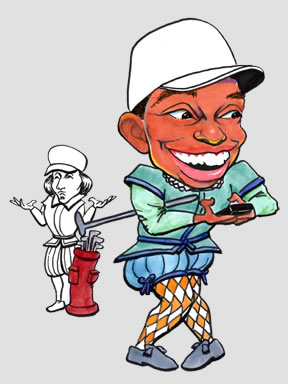Tiger Woods of Verona
Shakespeare Previews Today's Headlines
With the Sex Scandals of Gentlemen
 Two Gentlemen of Verona is a play I could never get my head around. Proteus is this guy in Verona who dotes on his girlfriend, Julia. He dotes on his best buddy, Valentine, too, though the latter ribs Proteus mercilessly about his unmanly romantic inklings. Valentine goes off to Milan to serve the Duke, and wouldn't you know it, he falls in love himself with Sylvia. Proteus only wants to stay in Verona with Julia, but his dad sends him off to Milan, as well, and, wouldn't you know it, he falls in love with Sylvia, too.
Two Gentlemen of Verona is a play I could never get my head around. Proteus is this guy in Verona who dotes on his girlfriend, Julia. He dotes on his best buddy, Valentine, too, though the latter ribs Proteus mercilessly about his unmanly romantic inklings. Valentine goes off to Milan to serve the Duke, and wouldn't you know it, he falls in love himself with Sylvia. Proteus only wants to stay in Verona with Julia, but his dad sends him off to Milan, as well, and, wouldn't you know it, he falls in love with Sylvia, too.
Then Proteus schemes to get his best friend banished so he can have unfettered access to Sylvia, but Sylvia can't stand him and tries to flee Milan. Proteus catches up with her and attempts to rape her but is stopped by Valentine himself. And then, Valentine gives Sylvia over to the man he still considers, after all this, to be his best buddy. Shakespeare lost me with that plot twist, though I guess, it's not much different than Butch Cassidy and the Sundance Kid or the NBA. Then Julia, who had been following Proteus in disguise, reveals herself, Proteus realizes he loved her most all along, and everybody heads home happy. Okaaay.
When I was reading the play recently, however, one line jumped out at me. After the two pals reconcile over Sylvia and then reconcile with the Duke who reconciles with the outlaws (like Valentine, they were banished lords), Valentine promises to tell all on their way back to Milan. Shakespeare doesn't relate how Proteus reacts to that, but the next line is Valentine's: “Come Proteus, 'tis your penance but to hear the story of your loves discovered” (V.4.173).
Welcome to your very own Shakespeareance, Tiger Woods (Arnold Schwarzenegger, Anthony Weiner, John Edwards, Mark Sanford, Eliot Spitzer, John Ensign).
Scholars write about the sanctity of male friendships in the Renaissance as the overriding theme of Two Gents and the underlying explanation for Valentine's behavior. Applying that paradigm, the most dishonorable thing Proteus does is not dump a girlfriend without even texting her and then sexually assaulting another woman; it's abusing his best friend's interests. That's kind of like former Nevada Senator Ensign being hauled before the Ethics Committee for the possibility that he paid off his best friend with campaign funds rather than for having an affair with his best friend's wife while both were in his employ.
The scholars may be right, but my Shakespeare simply was writing a play about boys being boys. Two Gents is all about sex in general and sex scandals in particular. And not just Proteus's: the Duke, prompted by Proteus, makes up an illicit affair in order to trap Valentine, and the Third Outlaw was banished from Verona for “practicing to steal away a lady” (IV.1.47), which the First Outlaw lumps in with the Second Outlaw's stabbing a man in the heart as “petty crimes” (I'm still having a hard time getting my head around some aspects of this play). Then there's Valentine's servant, Speed. In Act II, Scene 1, he noted the behavioral traits of lust in his master and also saw through Sylvia's flirtatious come-on toward Valentine. If Shakespeare were writing the Tiger Woods story, Speed would be the caddy, stating the obvious to the smitten golfer: “My lord, thou should not store thy mistress's number in the phone, lest your wife discover it.”
With Shakespeare doing a play about boys being boys, he naturally dives deep into the universal truths of that theme.
One, the man who falls in lust for a woman that is not the woman with whom he already is in a relationship forges warped logic to abjure responsibility and justify his actions. Proteus has two soliloquies to this effect. The first is at the end of II.4 after he has met Sylvia for the first time and convinces himself that "her picture hath dazzled my reason's light: But when I look on her perfections, there is no reason but I shall be blind. If I can check my erring love, I will: If not, to compass her I'll use my skill.” Hey, he just can't help it if Sylvia proves to be his soul mate despite his earnest efforts to waylay his feelings, and so, in case he simply can't suppress his lust, he's prepared to take her hiking on the Appalachian Trail.
Proteus' next soliloquy comes at the start of II.6. He's given into his lust and now must work out his justification. “O sweet-suggesting Love, if thou has sinned, teach me, thy tempted subject, to excuse it.” First, he tries to denigrate Julia: “At first I did adore a twinkling star, but now I worship a celestial sun. Unheedful vows may heedfully be broken, and he wants wit that wants resolved will to learn his wit t'exchange the bad for better.” Not that there's anything “bad” about Julia, he admits; it's just that Sylvia is blonde or wears spray-painted jeans or speaks with an Argentine accent. Next, he needs to conclude that hurting both his girlfriend and best buddy is an OK thing to do: “If I keep them, I needs must lose myself. If I lose them, thus find I by their loss.” Proteus is entirely self-centered here, even saying, “I to myself am dearer than a friend.” He hasn't even taken into account Sylvia's feelings; he just assumes she'll share his. Boy, is he surprised when she doesn't. What's her deal?
Which brings us to the second universal theme: when boys are boys they are pretty stupid. It's not lack of intelligence, it's their own worldview—i.e., lust—that shapes their perspective so completely they can't accept anybody else's perspective or see all the potential consequences of their behavior. Proteus sends Sylvia tokens (including a dog) in exchange for her portrait; today he'd be e-mailing pictures of his body parts. That is what Speed would call “present folly” (II.1.59). “You, being in love, cannot see to put on your hose,” Speed tells Valentine, noting that not only is his master acting erratically, but that his love-interest, Sylvia, really isn't as good looking as he contends (though aside from Speed she does have a way of dazzling men; maybe it's the beret).
Universal theme three: because boys will be stupid boys, they will inevitably get caught. Though the rest of us say, “duh!” when we discover the tripwire was something so simple as a miss-sent e-mail or an unerased text message, the perpetrator has that self-centered worldview fogging his intellect. Thus, Proteus could not have foreseen that when Valentine was banished, he'd go no further than the woods adjacent to Milan. Duh! And as I've noted above, when boys are caught, the publicity will reach to the outer realm of their particular existence; for Proteus, that means the whole court at Milan will know his story; for Edwards, Ensign, and Weiner, it was the national court of opinion; for Arnold and Tiger it was everywhere.
Universal theme four: the mea culpa ends up being seen by the perpetrator as punishment enough. “My shame and guilt confounds me,” Proteus says. “If hearty sorrow be a sufficient ransom for offence, I tender't here. I do as truly suffer as e'er I did commit” (V.4.77). Uh-huh. But, then, doesn't that usually end up being the sum total of the punishment? Certainly, Proteus might lose his place in court, but in a year or less he'll have a job with the town crier as a commentator on court activities, earning more money to boot. Valentine, in fact, not only is willing to forgive Proteus then and there, he gives up his claim to Sylvia to him. Then Julia standing by in disguise faints (universal theme five: there's always another bizarre development in these boys-will-be-boys scandals, like a tattooed performance artist coming out of the woodwork saying, “Me, too!”). Now Proteus sees that Sylvia really is no better than Julia (they're both blondes! I forgot that about Julia), and wants to be with her forever. And Julia still wants to be with him forever. She stands by her man.
Sylvia says nothing. Her silence from the moment of the assault through to the end of the play might be Shakespeare's loudest comment on the whole proceeding, if we could only discern for sure what he thought she was thinking. If we accept the Renaissance paradigm on male bonding, she's blown away by Valentine's gallantry and is holding his arm, beaming bright. But as we're talking about how Shakespeare seemed to be so in tune with universal themes, I see Sylvia standing to the side, pondering how much money she'll get suing Proteus and biding her time until she can thoroughly take down Valentine.
Eric Minton
September 21, 2011
Comment: e-mail editorial@shakespeareances.com
Start a discussion in the Bardroom



 Find additional Shakespeareances
Find additional Shakespeareances